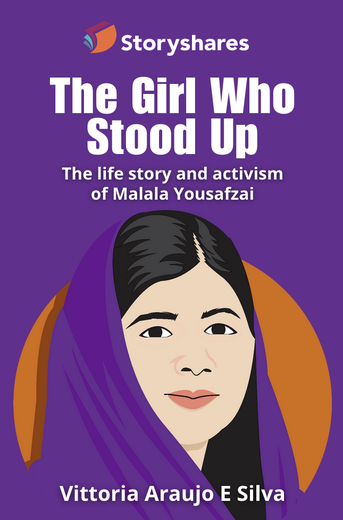
Age:
Middle School
Reading Level: 5.3
Chapter One: A Warrior Was Born
Malala Yousafzai was born in Mingora. It was a small city in Pakistan's Swat Valley.
Most families hoped for sons. Ziauddin Yousafzai was different. When his wife gave birth to a daughter on July 12, 1997, he celebrated. It was a culture that often valued boys more than girls, but Ziauddin saw something special in his newborn daughter. While other fathers might have been disappointed, he whispered promises into her tiny ears. "You will be free," he told her. "You will be educated."
Malala's name was important. She was named after Malalai of Maiwand. Malalai was a legendary Pashtun poet. She inspired Afghan fighters in battles against British troops in 1880. This Malala would also become a fighter—not with weapons, but with words.
The Swat Valley was beautiful. Green mountains surrounded their home. Crystal rivers cut through the landscape. It was a place of stunning natural beauty. It was rich in culture and deep traditions. But it was also a place where girls' futures were often limited.
Malala's father, Ziauddin, was different from many men in his community. He was a passionate educator. He ran a school and believed that every child deserved an education. His wife was more traditional, but supportive. She watched as he read to Malala.
He taught her to question. He taught her to think. He taught her to dream.
As Malala grew, she absorbed her father's passion for learning. While other girls were being prepared for marriage, she was being prepared to change the world. Her childhood was filled with books. It was filled with discussions. It was filled with the radical idea that she was just as valuable as any boy.
Little did anyone know that this small girl in the Swat Valley would one day become a global symbol of courage.
Chapter Two: The Shadow of the Taliban
Malala was twelve years old when everything changed. The Taliban were moving closer to the Swat Valley. Their black flags began appearing in nearby towns. Across the region, their strict rules spread like a dark wave.
Music disappeared first. Then television sets were destroyed. Women were forced to wear complete coverings. Girls' schools became targets. The Taliban believed education was dangerous—especially for girls.
Ziauddin's school became a battleground of ideas. He refused to close it. He continued teaching girls despite growing threats. Malala watched her father's courage. She learned that silence was not an option.
The sound of explosions became normal. Schools were bombed. Entire buildings crumbled. Fear settled over the community like a heavy blanket. Many families sent their daughters home. Many schools closed forever.
Malala started writing about her experiences. She used a blog name to protect herself. "Gul Makai" became her writing identity. Her words described the terror around her. She wrote about girls losing their right to learn.
Her father was proud. He knew her words were stronger than threats. Malala documented how the Taliban destroyed dreams. She showed the world what was happening in the Swat Valley.
The Taliban heard about her writing. They did not like a young girl speaking out. Threats began. But Malala would not be silenced. She continued writing. She continued speaking. She continued hoping.
Her small act of rebellion would change everything.
Chapter Three: The Day Everything Changed
The morning of October 9, 2012 was like any other school morning. Malala woke up early. She got dressed carefully. She packed her books into her school bag. The bus ride would be normal.
Or so she thought.
The school bus went through the mountain roads. Girls chatted and laughed. Malala sat with her friends. She was wearing a blue sweater. Her hair was neatly combed.
Suddenly, a man stepped onto the bus. He was wearing local clothing. His face was covered. He asked a simple question. "Which one of you is Malala?"
Silence filled the bus.
Then he raised his gun. He fired three shots. One bullet went through Malala's head. The other girls were terrified. Blood covered her blue sweater.
Malala was rushed to the hospital. Doctors worked quickly. Her condition was critical.
The Taliban had claimed responsibility. They wanted to stop her voice.
But Malala survived. She was transferred to a hospital in Birmingham, England. Doctors performed multiple surgeries. She fought for her life while the world watched and waited.
The attack became international news. People everywhere were shocked that a young girl had been shot for wanting an education. Malala became a symbol of resistance. Her story spread across continents.
While she recovered, her message grew stronger. The Taliban had tried to silence her. Instead, they had made her voice louder than ever.